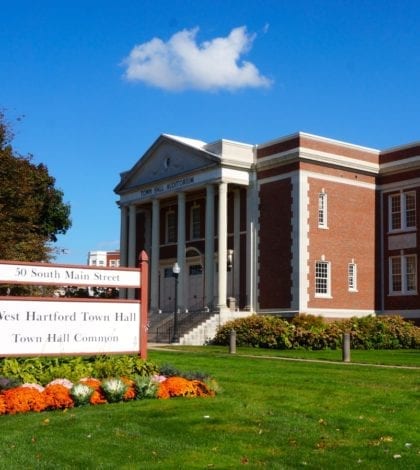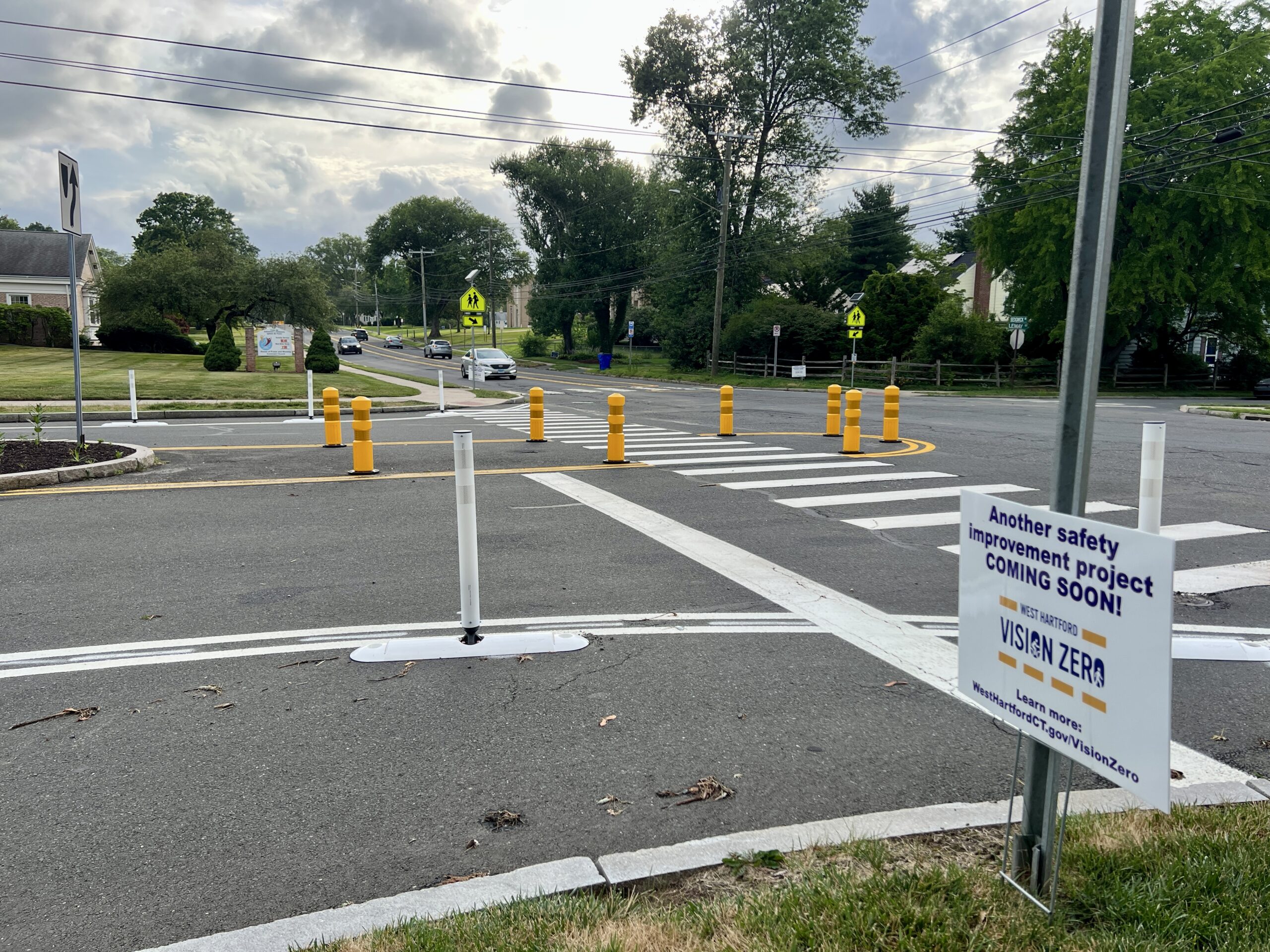West Hartford Town Council Will Not Issue Supplemental Motor Vehicle Bills

Audio By Carbonatix

West Hartford Town Hall. Photo credit: Ronni Newton
The Town of West Hartford will be adding to the pension fund but is able to do that through existing surplus as well as some other changes in revenue.
By Ronni Newton
West Hartford residents will not be getting supplemental motor vehicle tax bills this fiscal year.
On Tuesday night the West Hartford Town Council tabled a resolution recommending levying the additional tax, which would have increased the mill rate on automobiles from 32 to 37 mills and generated approximately $2.3 million in revenue to be earmarked for the reduction of future pension liabilities.
The town will still plan to add $2.3 million to the pension fund, based on the advice of its financial advisor and actuaries, in order to reduce the discount rate from 7.5 percent to 7.25 percent and incorporate a new mortality table – measures that, along with bolstering the fund balance ratio, have been recommended in order to maintain the town’s AAA bond rating. In October, Moody’s Investment Services amended West Hartford’s credit outlook from Aaa “stable” to Aaa “negative watch.”
However, Mayor Shari Cantor said prior to Tuesday’s meeting that after discussions with Chief Financial Officer Peter Privitera and Town Manager Matt Hart, it became clear that pension liabilities could be reduced and the credit watch could be addressed without the need to go back to taxpayers.
“The numbers are more positive than predicted,” Cantor said.
A large property, the Hebrew Center for Health & Rehabilitation, became a for-profit entity and will now generate tax revenue for the town. In addition, Cantor said, the appeals process for revaluation has moved along faster than expected and the results are more favorable to the town’s revenue stream than budgeted.
Privitera initially recommended levying the additional motor vehicle tax after the state budget passed with cuts in aid to West Hartford. He told We-Ha.com after Tuesday night’s Town Council meeting that his most recent analysis indicated that the FY2018 surplus is now estimated at $3.1 million – $1.5 million more than his previous estimate.
The Hebrew Center for Health & Rehabilitation, valued at approximately $12 million, will now generate $400,000 to $500,000 in revenue, Privitera told the Town Council on Tuesday.
Privitera said it was determined prior to Tuesday’s meeting, after discussions with Council members and Hart, that there would be sufficient surplus to apply to the pension plan, plus leave some extra set aside to smooth out any further adjustments.
“If we can fund that out of surplus rather than raising the motor vehicle tax rate, we’d rather do that,” Privitera said.
“We now feel that we don’t need to go to the taxpayer to stabilize our AAA bond rating. We can do it from our existing revenue stream,” Cantor said.
The Town Council also voted unanimously Tuesday night to accept the recommendation of its ad hoc Subcommittee on Economic Development and terminate the agreement to purchase the 58-acre UConn property. Cantor, who is a member of the University’s Board of Trustees, recused herself from the discussion and abstained from the vote. She said she was not involved in any discussion that UConn trustees had on the matter either.
The funds that the town would have been used to purchase the UConn property are now available in the Capital Non-Recurring Expenditure (CNRE) fund.
Supplemental bills will still be sent out later this week to residents who added or changed vehicles after the Grand List was calculated, with the tax calculated based on the 32 mill rate. That process takes place at the end of every year.
The West Hartford Town Council on Tuesday night also unanimously approved using $3.2 million of surplus remaining from FY2017 to bolster the General Fund balance, increasing the ratio from 8.1 to 9 percent.
Using the surplus to add to the fund balance is important to preserve the town’s top bond rating, Privitera said. “Moody’s had commented that our ratio is much lower than other peer communities,” he said last week.
Privitera, who will meet with Moody’s next week in advance of the January bond sale, said that he expects the rating agency will take West Hartford off negative watch.
Maintaining the top bond rating is important because it means the town’s borrowing cost is lower, and also creates a positive environment that encourages economic development, Privitera said.
Like what you see here? Click here to subscribe to We-Ha’s newsletter so you’ll always be in the know about what’s happening in West Hartford!




No problem because the town just levies the biggest tax increases on rentals where it gets hidden into higher rents. The end result is that tenants just leave when the rent gets too high rather than banging on the podium at Town Council meetings talking about the “cruelty” of not jacking the taxes to whatever collective bargained employees ask for.
Those evil landlords can afford the taxes becoming up to 1/3 of gross receipts before paying ANY other expenses, and even several empty months with NO revenue as well as dealing the adverse selection of higher risk tenants who are the few willing to pay higher rents. Then when they pull out a permit to replace an appliance they can send in the tax assessor in ADDITION to the safety inspector to look for more “revenue opportunities”.
It’s totally “fair” though because everyone can come hat in hand begging, pleading, wheeling and dealing at special hearings to try to get their valuation adjusted. Who CARES that it’s an “opt out” process where you are disadvantaged by the default. It’s great fun for lawyers who love red tape and in the end the higher taxes ALWAYS go through.
Just because someone was DUMB enough to cash out their retirement revenue to invest in rentals and improve them, is nobody else’s problem after all. Bleed em’ dry!!!!